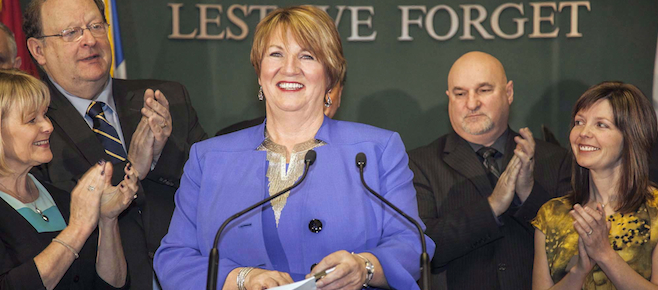The January surprise: Kathy Dunderdale steps down
The once-popular PCs now lag far behind
Newfoundland and Labrador Premier Kathy Dunderdale announces her resignation on Wednesday Jan. 22, 2014. THE CANADIAN PRESS/Graham Kennedy
Share

It was only four weeks ago that Kathy Dunderdale was pooh-poohing the very notion that she would resign as Premier of Newfoundland and Labrador.
In her year-end interviews with the local media, she was asked repeatedly about the swirling rumours that she had no taste to stay and fight the next provincial election, scheduled for Oct. 2015. And her answers were unequivocal.
“I am not [going to resign],” the premier told radio station VOCM. “I’ll be here in 2015.” Did that mean she was going to run again, asked the reporter? “Absolutely,” was Dunderdale’s response.
What happened between Christmas and this morning, when Dunderdale stood at a podium in the lobby of the Confederation Building in St. John’s and announced her plans to step down both as Premier and leader of the Progressive Conservative party, as of this Friday?
“Ancient Hebrew scriptures teach us that there is a time for everything, and a season for everything under heaven,” said the Premier, channeling both Ecclesiastes and The Byrds. “I have discovered that this is also applicable to public service. Just as you know when it was time to step up, you also know when it is time to step back, and that time, for me, is now.”
The celestial signs were probably not that difficult to read. And neither were the polls.
When the 61-year-old took over the job from Danny Williams in Dec. 2010, after his shock resignation, she was among the most popular politicians in the country. (Albeit never quite as loved as Williams, whose own approval rating was 92 per cent when he stepped down.) In the election held in Oct. 2011, she led the Tories to a convincing victory, capturing 37 of the 48 seats in the House of Assembly. But two-and-a-half years later, a series of missteps and miscommunications had driven her own approval rating, and that of the party, to alarming lows. An Angus-Reid survey released last week, found that just 24 per cent of respondents in the province thought she was doing a good job. And the PCs are now lagging far behind the Liberals and their new leader Dwight Ball.
If that trend line wasn’t clear enough, the defection of her caucus leader Paul Lane to the Grits, earlier this week, certainly threw it into relief. A longtime Tory and fierce partisan, he said his constituents had been telling him they had lost faith in the government. And he laid the blame squarely on Dunderdale. She lacked empathy and the common touch, he suggested, citing her lackluster performance when her citizens needed her most.
“Whether it be the issue on search and rescue, the forest fire in Labrador this past summer, or the flooding on the Burin Peninsula. One recurring question has been asked by the people of Newfoundland and Labrador: ‘Where is the premier?’ ” said Lane. A delayed, and not entirely sympathetic, response to a series of rolling blackouts that crippled the province after a Jan. 2 storm was the final straw, he said. “I say to the premier that while her intentions may be honourable, I believe that our government has lost its way, and has indeed forgotten to listen to the people of Newfoundland and Labrador. I believe that our government has become very complacent.”
Dunderdale cut short a Florida vacation and returned to St. John’s to try and deal with the crisis. But her caucus had already made up its mind: it was time for her to hand over the helm.
In her resignation speech, the Premier recited a lengthy list of her accomplishments in office, including a financing agreement for the massive $7.7 billion Muskrat Falls power project, lower taxes and a rate of economic growth that leads the nation. “On every scale, Newfoundlanders and Labradorians are better off than when we started,” she said.
Dunderdale also expressed pride in having blazed a path as the province’s first female premier. “I hope I have stoked the fires of imagination in young girls in our province and inspired them to consider running for public office.”
Despite her place in history books, however, she is most likely to be remembered as the premier who came after Danny Williams. The one who was left to make the cuts and clean up the deficits when the oil-fueled provincial economy cooled. Her resignation may have been a surprise, but it wasn’t a shock. It was her turn, turn, turn.